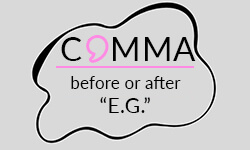
Comma placement can be a challenge for many students, especially in academic writing. This is often because they may not be fully aware of the rules and exceptions that apply to the usage of commas. In this article, we aim to help clarify one instance where comma placement can be tricky. We provide examples and explain the exceptions to the rules of when to use a comma before or after “e.g.,” while also offering a practice sheet for students to test their understanding.
When to place a comma before or after “e.g.”
The abbreviation “e.g.” stands for the Latin phrase “exempli gratia”, which translates to “for example” in English. You always use a comma before and after “e.g.” because the abbreviation introduces added, non-essential information to the main part of your sentence. It is parenthetic.
Comma
Parenthetical clause
No comma
British style guide
Parentheses
Colon
Comma rules can vary depending on style guides and the complexity of sentences, which can result in exceptions to comma placement. Consider readability without commas.
Comma before or after “e.g.”
Generally, you always put a comma before and after “e.g.”. The use of a comma before and after “e.g.” serves as a punctuation convention to signal the introduction of examples that illustrate the preceding statement.
Parenthetical clause
Placing a comma before and after “e.g.” helps set off the examples and indicates to the reader that a list of illustrative examples follows. It enhances readability and guides the reader’s understanding, making it easier to distinguish between the general statement and the specific examples provided. In formal writing, adhering to established punctuation conventions, such as using a comma before and after “e.g.,” ensures clarity and consistency in communication.
Note: Never add “etc.” to an “e.g.” list. This is because “for example” already implies that other examples are being omitted.
No comma before or after “e.g.”
The use of a comma after “e.g.” is a matter of style, and different style guides may have varying recommendations. When adhering to the British style guide, you do place a comma before “e.g.,” however, the following comma is omitted.
British style guide
In British English, some style guides, such as The Oxford Style Manual and The Guardian Style Guide, omit the comma after “e.g.” in certain cases. The decision to omit the comma may be based on a desire for a cleaner and more streamlined appearance in written text. Additionally, some argue that omitting the comma can enhance readability by avoiding potential visual clutter.
It’s important to note that style preferences can vary, and different publications or organizations may follow different guidelines. Writers and editors often adhere to the specific style guide prescribed by the publication they are writing for or the organisation they are a part of.
Note: When using the American style guide, you place a comma after “e.g.”. However, if you’re using the British style guide, you do not place a comma after “e.g.!”
Parentheses
When “e.g.” is used within brackets, a comma typically follows it. However, the comma before “e.g.” is being omitted. The comma helps to separate the example or examples that follow from the abbreviation.
Colon
You do not need to put a comma after “e.g.” if a colon follows it. The use of a colon after “e.g.” takes the place of a comma. In English punctuation, it’s typical to use either a comma or a colon after “e.g.” to introduce an example, but not both. Remember, the choice between a comma or a colon after “e.g.” depends on the structure and flow of the sentence.
Test yourself!
Practice sheet
In the following, practice sentences for using commas before or after “e.g.” are provided. Check the solution in the second tab named “answers.”
- The team specializes in various fields e.g. marketing and finance.
- We need to focus on key aspects, e.g. budget and timeline.
- The benefits include flexible working hours e.g. remote work.
- Our company provides services in multiple sectors, e.g. technology and healthcare.
- When working on this project, consider essential factors e.g., cost and efficiency.
- The ingredients for the recipe include common items, e.g., flour and sugar.
- The team members possess diverse skills e.g., project management and coding.
- Key responsibilities involve managing projects, e.g., coordinating tasks and tracking progress.
- The company offers a range of products, e.g. electronics and clothing.
- The conference will cover various topics e.g. artificial intelligence and sustainability.
- The team specializes in various fields, e.g., marketing and finance. (Comma)
- We need to focus on key aspects, e.g., budget and timeline. (Comma)
- The benefits include flexible working hours, e.g., remote work. (Comma)
- Our company provides services in multiple sectors, e.g., technology and healthcare. (Comma)
- When working on this project, consider essential factors, e.g., cost and efficiency. (Comma)
- The ingredients for the recipe include common items, e.g., flour and sugar. (Comma)
- The team members possess diverse skills, e.g., project management and coding. (Comma)
- Key responsibilities involve managing projects, e.g., coordinating tasks and tracking progress. (Comma)
- The company offers a range of products, e.g., electronics and clothing. (Comma)
- The conference will cover various topics, e.g., artificial intelligence and sustainability. (Comma)
Note: The comma after “e.g.” can be omitted in every sentence above if you adhere to the British style guide.
- ✓ Free express delivery
- ✓ Individual embossing
- ✓ Selection of high-quality bindings
FAQs
A comma is typically placed before as well as after “e.g.”.
The correct punctuation of “e.g.” is with a comma before and after it. Do not forget to put dots after the “e” and “g.”
“E.g.” is used in the middle of a sentence to introduce examples. A comma is placed before and after “e.g.” to set off the examples.
Example
- The team excels in various areas, e.g., marketing, research, and client relations.
In British English, the use of a comma after “e.g.” is often omitted.
